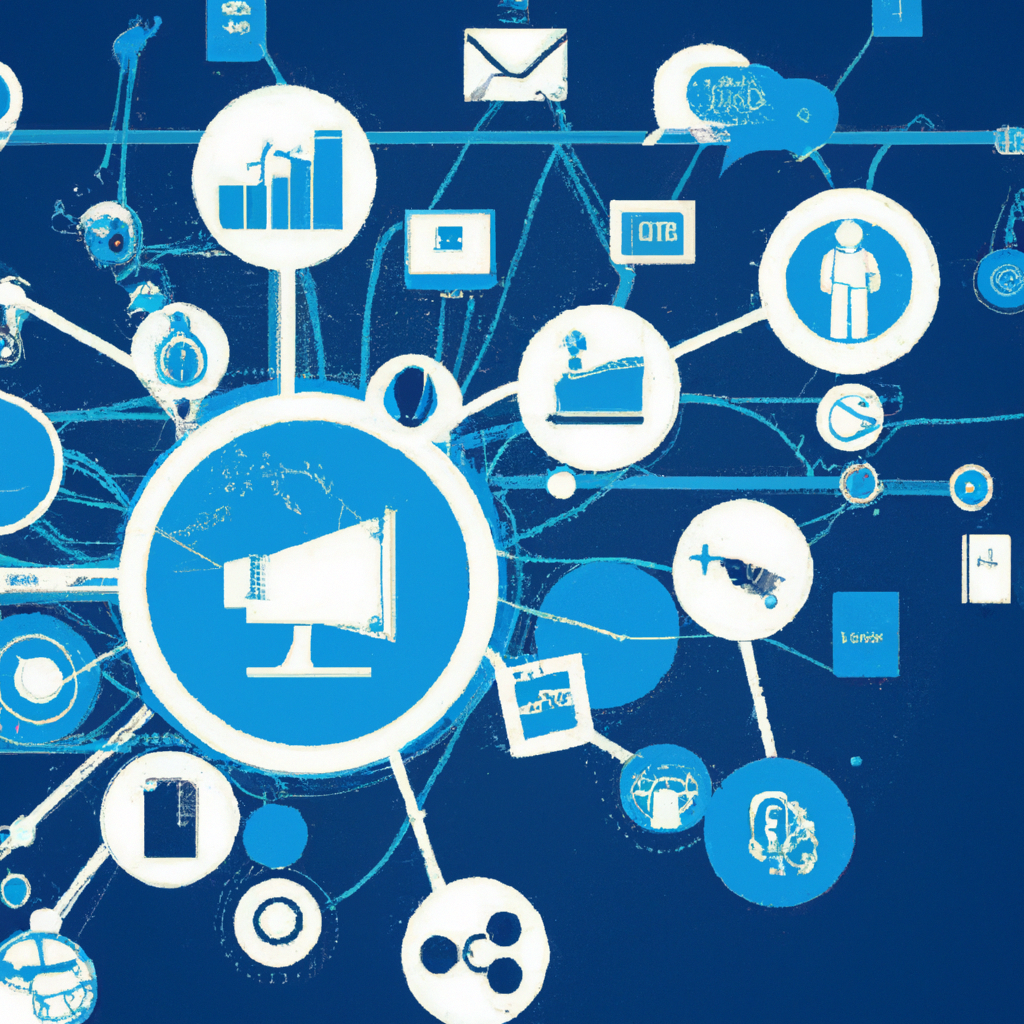Have you ever wondered what marketing automation is and how it actually works? Look no further, as this article aims to provide a simple and straightforward explanation. In today’s rapidly evolving digital landscape, marketing automation has become a crucial tool for businesses to streamline and optimize their marketing efforts. By automating repetitive tasks and leveraging data-driven insights, marketing automation enables companies to deliver personalized customer experiences at scale. In this article, we will explore the fundamental concepts behind marketing automation and uncover its benefits and functionalities. So, let’s dive in and demystify the world of marketing automation!

What is Marketing Automation?
Definition of marketing automation
Marketing automation is a technology-driven strategy that enables companies to streamline and automate their marketing tasks and workflows. It involves the use of software platforms and tools to automate repetitive marketing processes, such as email campaigns, social media posting, lead nurturing, and customer segmentation. By automating these tasks, businesses can save time and resources, improve efficiency, and deliver personalized and targeted content to their audience.
Benefits of marketing automation
Implementing marketing automation can bring numerous benefits to a business. Firstly, it enables marketers to save time and effort by automating repetitive tasks, allowing them to focus on more strategic initiatives. Marketing automation also helps improve the accuracy and effectiveness of campaigns by segmenting and targeting specific audiences based on their behavior and interests. Additionally, automation allows for better lead nurturing and conversion, as businesses can personalize the customer journey and deliver timely and relevant content. Lastly, marketing automation provides valuable data and insights for analyzing and optimizing marketing efforts, leading to better decision-making and improved return on investment (ROI).
How Does Marketing Automation Work?
Gathering and storing customer data
The foundation of marketing automation is the collection and storage of customer data. This data includes demographic information, browsing behavior, purchase history, and engagement with marketing materials. This information is collected through various channels, such as website forms, email subscriptions, social media interactions, and customer surveys. By centralizing this data in a customer relationship management (CRM) system or marketing automation platform, businesses can have a comprehensive view of their customers and prospects.
Segmenting and targeting audiences
Once customer data is gathered, businesses can segment their audience based on specific criteria or characteristics. Segmentation allows for better targeting and personalization of marketing campaigns, as different audience segments have different needs and preferences. By creating targeted segments, businesses can tailor their messaging and content to resonate with each group, ultimately increasing engagement and conversion rates.
Creating and deploying marketing campaigns
With marketing automation, businesses can create and set up various types of marketing campaigns, such as email, social media, and SMS campaigns, in advance. These campaigns can be designed with pre-set triggers or conditions, allowing them to be automatically deployed based on specific customer actions or behaviors. For example, if a customer abandons their shopping cart on an e-commerce website, an automated email can be triggered to remind them to complete their purchase.
Lead scoring and nurturing
An essential aspect of marketing automation is lead scoring and nurturing. Businesses assign scores to their leads based on their level of engagement and readiness to make a purchase. This scoring system helps identify the most qualified leads, allowing businesses to focus on nurturing and converting those with the highest potential. Through automated lead nurturing workflows, businesses can deliver personalized content and communications to move leads further down the sales funnel.
Analyzing and optimizing results
Marketing automation platforms provide businesses with detailed analytics and reporting capabilities. These tools allow marketers to measure the effectiveness of their campaigns, track key performance indicators (KPIs), and gain valuable insights into customer behavior and preferences. By analyzing these data, businesses can identify areas for improvement, make data-driven decisions, and optimize their marketing strategies for better results.
Key Features and Tools of Marketing Automation
Email marketing automation
Email marketing automation is one of the most common and powerful features of marketing automation platforms. With this feature, businesses can create personalized and targeted email campaigns based on customer behavior, preferences, and lifecycle stage. Automated email workflows can be set up to send welcome emails, abandoned cart reminders, follow-ups after a purchase, nurture leads, and more. This automated approach saves time and ensures that the right message reaches the right audience at the right time.
Lead generation and management
Marketing automation platforms provide tools for lead generation and management. These tools include customizable landing pages, lead capture forms, and automated lead nurturing workflows. Businesses can use these features to attract and collect contact information from potential customers, automate lead qualification and scoring processes, and nurture leads throughout the buyer’s journey. This helps businesses build a pipeline of qualified leads and improves the efficiency of their sales and marketing efforts.
Customer relationship management (CRM) integration
Integration with CRM systems is a crucial feature of marketing automation platforms. By connecting marketing automation with CRM, businesses can have a consolidated view of their customer data, including contact information, purchase history, and engagement with marketing campaigns. This integration allows for better alignment between sales and marketing teams, streamlines communication and collaboration, and enables targeted and personalized marketing efforts based on the complete customer profile.
Social media marketing automation
Social media marketing automation allows businesses to schedule and automate their social media posts across multiple platforms. With this feature, marketers can plan and create content in advance, set specific times for posts to go live, and even automate responses to social interactions. This automation simplifies the social media management process, saves time, and ensures consistent brand messaging and engagement across various social media channels.
Analytics and reporting
Marketing automation platforms provide detailed analytics and reporting features that offer insights into the performance of marketing campaigns, audience engagement, and ROI. Marketers can track metrics such as open rates, click-through rates, conversions, and revenue generated. These insights help businesses understand the effectiveness of their marketing efforts, make data-driven decisions, and identify opportunities for improvement and optimization.
Choosing the Right Marketing Automation Platform
Identifying your marketing goals and objectives
Before selecting a marketing automation platform, it is crucial to clearly define your marketing goals and objectives. Determine what you aim to achieve with marketing automation, whether it is improving lead generation, increasing customer retention, or streamlining event marketing. Having a clear understanding of your goals will help you evaluate platforms based on their suitability for your specific needs.
Determine your budget and resources
Budget and resource allocation are important considerations when choosing a marketing automation platform. Evaluate your budget constraints and determine the resources and personnel available for platform implementation, integration, and ongoing management. Consider the scalability and pricing structure of the platform to ensure it aligns with your budget and can accommodate future growth.
Evaluate platform features and capabilities
Different marketing automation platforms offer various features and capabilities. Assess the core features, such as email marketing automation, lead management, and CRM integration, to ensure they meet your requirements. Additionally, explore any advanced features or integrations that may be beneficial to your business, such as social media automation or predictive analytics. Consider your specific industry and marketing needs when evaluating these features.
Consider integration and scalability
An important factor to consider is the platform’s ability to integrate with other tools and systems your business currently uses. Integration with CRM systems, e-commerce platforms, and other marketing tools is essential for a seamless flow of data and efficient operations. Additionally, assess the scalability of the platform to ensure it can accommodate your business’s growth and evolving marketing needs.
Read customer reviews and testimonials
Before making a final decision, it is valuable to read customer reviews and testimonials of the marketing automation platforms you are considering. These reviews can provide insights into the user experience, customer support, and overall satisfaction of existing users. Look for reviews from businesses in similar industries or with similar marketing goals to gain a better understanding of the platform’s suitability for your specific needs.

Common Use Cases for Marketing Automation
Lead nurturing and conversion
One of the most common use cases for marketing automation is lead nurturing and conversion. Through automated workflows, businesses can deliver personalized and relevant content to leads at each stage of the buyer’s journey. By nurturing leads with targeted messaging, businesses can build trust, educate prospects about their offerings, and move them closer to making a purchase.
Drip email campaigns
Drip email campaigns are another popular use case of marketing automation. These campaigns involve sending a series of pre-scheduled, automated emails to subscribers or leads over a specified period. Drip campaigns can be designed to welcome new subscribers, provide educational content, offer promotions or discounts, or re-engage dormant leads. By automating these campaigns, businesses can deliver consistent and timely messages to their audience without manual intervention.
Automated social media posting
Automation can also simplify social media management and posting. Businesses can use marketing automation platforms to schedule and publish their social media posts in advance across multiple platforms. This allows businesses to maintain a consistent and active social media presence without the need for manual posting. Automated social media posting ensures that content is distributed consistently and at optimal times, improving engagement and reach.
Personalized customer journeys
Marketing automation enables businesses to create personalized customer journeys based on individual preferences, behaviors, and lifecycle stages. By automating the delivery of content and touchpoints along the customer journey, businesses can provide a tailored experience to each customer. This personalization enhances engagement, builds brand loyalty, and increases the likelihood of conversions.
Event marketing and attendance tracking
Marketing automation can be beneficial for event marketing and attendance tracking. Automated workflows can be created to promote events, send invitations, and track attendee responses. Through marketing automation, businesses can communicate with event attendees before, during, and after the event, providing relevant information, reminders, and follow-ups. The automation of event marketing and attendance tracking streamlines the process, increases event attendance, and enhances the overall attendee experience.
Benefits of Marketing Automation
Increased efficiency and productivity
One of the significant benefits of marketing automation is increased efficiency and productivity. Automation eliminates the need for manual execution of repetitive marketing tasks, such as sending individual emails or posting on social media platforms. By automating these processes, marketers can focus on strategic initiatives, creative brainstorming, and analyzing data, resulting in improved productivity and time savings.
Improved customer targeting and engagement
Marketing automation allows for precise customer targeting and personalized messaging. By segmenting the audience based on specific criteria, businesses can deliver relevant and tailored content to each segment, increasing engagement and resonance. Personalized marketing messages that address customers’ specific needs and interests result in higher response rates, conversions, and long-term customer loyalty.
Better lead qualification and nurturing
Marketing automation enables businesses to implement lead scoring and nurturing workflows. By assigning scores to leads based on various data points, businesses can identify their most qualified leads and prioritize their efforts accordingly. Additionally, through automated nurturing campaigns, businesses can deliver consistent and relevant content to leads, guiding them through the buyer’s journey and increasing the chances of conversion.
Enhanced reporting and ROI tracking
Marketing automation platforms provide robust analytics and reporting capabilities that help businesses measure the effectiveness of their marketing efforts. Marketers can track key metrics, such as open rates, click-through rates, and conversion rates, to evaluate the success of their campaigns. This data allows for informed decision-making, identification of successful strategies, and the ability to optimize marketing efforts for better return on investment (ROI).

Challenges and Pitfalls of Marketing Automation
Lack of proper strategy and planning
One of the challenges of marketing automation is the lack of a proper strategy and planning. Without a clear understanding of marketing objectives, target audience, and desired outcomes, businesses may struggle to leverage the full potential of automation. It is essential to develop a comprehensive strategy and roadmap that aligns with business goals and objectives before implementing marketing automation.
Data quality and integration issues
Marketing automation relies heavily on the accuracy and quality of data. However, many businesses face challenges with data quality due to outdated or incomplete customer information. Additionally, integration issues between different systems and platforms can lead to data inconsistencies and gaps. It is crucial to address these data quality and integration issues before implementing marketing automation to ensure reliable and accurate data for effective campaigns.
Over-automation and generic messaging
While automation can streamline marketing processes, there is a risk of over-automation and generic messaging. Businesses need to strike the right balance between automation and personalization. Sending out generic or impersonalized messages can result in disengagement or opt-outs from the audience. It is crucial to customize messaging and content to resonate with each individual or segment, ensuring relevance and authenticity.
Learning curve and training requirements
Implementing marketing automation often requires a learning curve, especially for teams unfamiliar with the technology or platform. Training and education may be necessary to ensure that team members understand how to effectively use the automation tools and features. Adequate training and support can help overcome any initial challenges and ensure a smooth transition to marketing automation.
Constant monitoring and optimization
Marketing automation requires ongoing monitoring and optimization to maximize its benefits. Automated workflows, campaigns, and messaging need to be regularly reviewed and optimized based on performance data and customer feedback. This continuous monitoring and optimization process is crucial to ensure that marketing automation remains effective and aligned with business goals and objectives.
Best Practices for Successful Marketing Automation
Define clear marketing goals and KPIs
Before implementing marketing automation, it is crucial to define clear marketing goals and key performance indicators (KPIs). Aligning automation efforts with specific goals helps focus resources and enables effective measurement of success. Whether the goal is to increase lead generation, improve customer retention, or enhance brand loyalty, articulating clear objectives allows for better planning and implementation.
Segment and personalize your campaigns
Segmentation and personalization are key to successful marketing automation. Segment your audience based on demographic, behavioral, and psychographic factors. By delivering personalized content and messages tailored to each segment’s specific needs and preferences, businesses can achieve higher engagement and conversion rates. Utilize automation tools to allocate the right content to the right audience, maximizing the impact of your campaigns.
Regularly clean and update your data
Data quality is essential for effective marketing automation. Conduct regular audits and reviews of your customer data to identify and correct any inaccuracies, inconsistencies, or outdated information. Implement processes to collect and update customer data accurately and in real-time. By maintaining clean and reliable data, businesses can ensure the success of their automation workflows and drive better results.
Test and optimize your automation workflows
Continuous testing and optimization of automation workflows are vital for success. A/B testing different elements of your campaigns, such as subject lines, calls to action, or landing page designs, can provide insights into what resonates best with your audience. Utilize the analytics and reporting features of your marketing automation platform to identify areas for improvement and make data-driven decisions for optimization.
Continuously analyze and improve your results
Data analysis is a crucial aspect of successful marketing automation. Regularly review and analyze the performance metrics of your campaigns to understand what is working well and what needs improvement. Use the insights gained from data analysis to refine your automation strategies, make iterative improvements, and enhance the effectiveness of your marketing efforts.

Case Studies: Successful Implementations of Marketing Automation
Company A: Increasing lead conversion by 50%
Company A, a software-as-a-service (SaaS) provider, implemented marketing automation to improve lead conversion rates. By leveraging lead scoring and nurturing workflows, they were able to identify and prioritize the most qualified leads. Through personalized email campaigns and targeted content, engagement rates increased significantly. As a result, Company A saw a 50% increase in lead conversion, leading to a higher ROI on their marketing efforts.
Company B: Achieving higher customer retention with automation
Company B, an e-commerce retailer, used marketing automation to improve customer retention rates. By analyzing purchase history and customer behavior data, they created personalized email campaigns that targeted specific customer segments. These campaigns included recommendations based on past purchases and personalized offers. This strategic approach resulted in increased customer engagement and loyalty, ultimately leading to higher retention rates and repeat business for Company B.
Company C: Streamlining event marketing and attendance tracking
Company C, an event management company, implemented marketing automation to streamline their event marketing processes and attendance tracking. By automating the distribution of event invitations, reminders, and follow-ups, they were able to save time and resources. Additionally, automated workflows tracked attendee responses and provided real-time event updates. This automation improved communication, increased event attendance rates, and enhanced the overall attendee experience.
Conclusion
Marketing automation offers a wide range of benefits for businesses of all sizes and industries. By automating repetitive marketing tasks, businesses can save time, improve efficiency, and deliver personalized and targeted content to their audience. With features such as email marketing automation, lead generation and management, CRM integration, social media marketing automation, and analytics and reporting, marketing automation platforms provide comprehensive tools for successful marketing campaigns. However, it is essential to choose the right platform based on marketing goals, budget, resources, and integration needs. By following best practices and avoiding common pitfalls, businesses can leverage marketing automation to achieve increased efficiency, improved customer targeting, better lead qualification, and enhanced reporting and ROI tracking. Through successful implementations and case studies, it is evident that marketing automation can drive significant results and improve the overall effectiveness of marketing efforts.












